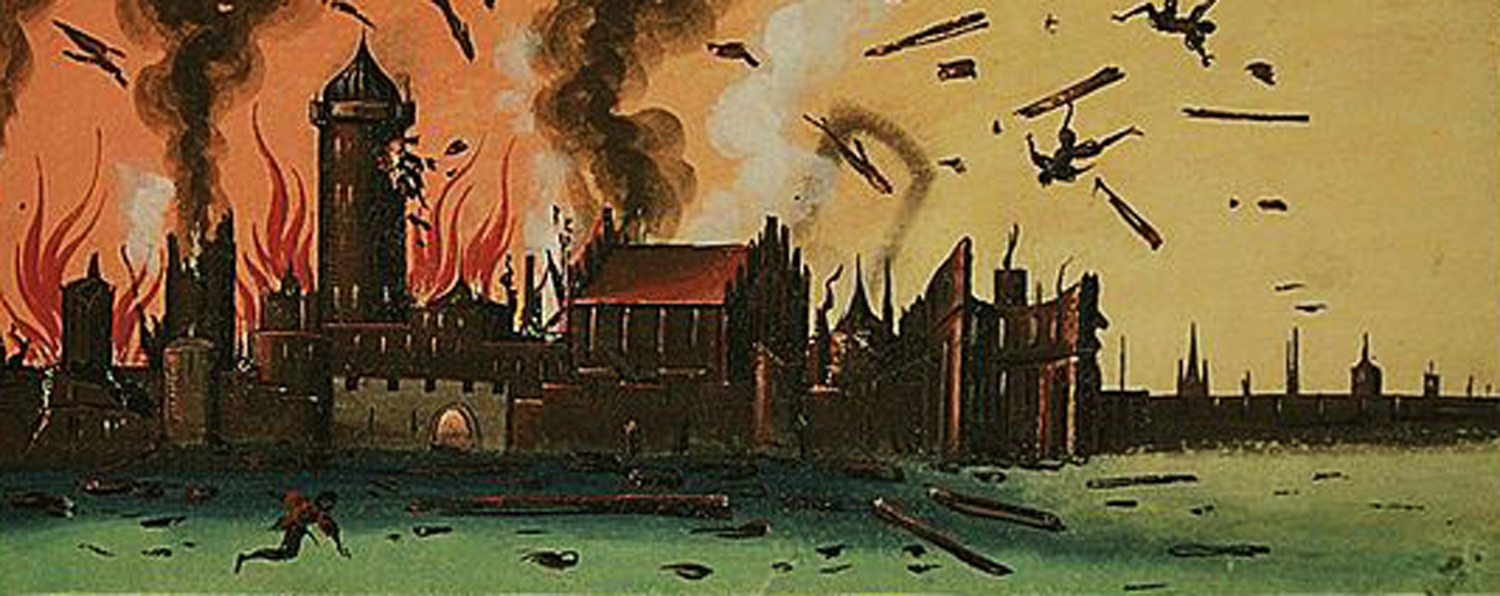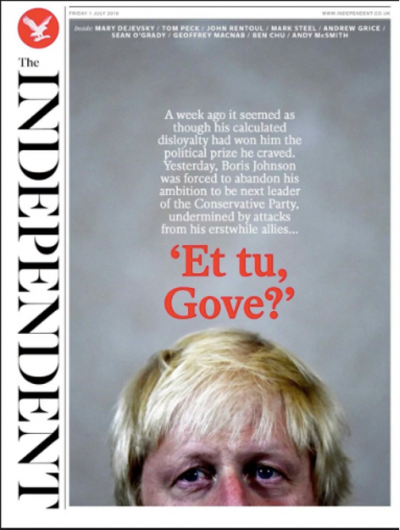
On1 July 2016, The Independent newspaper ran the headline “Et tu, Gove?” over a picture of Boris Johnson’s famous mop of blond hair. The headline paraphrased Julius Caesar, in which the dying Caesar recognises his protégé Brutus among his attackers and asks in disbelief or perhaps resignation, “Et tu, Brute?”[1] A week earlier, the Brexit referendum had resulted in a 52% majority voting to leave the European Union and Prime Minister David Cameron had immediately resigned. Johnson—the frontrunner to replace Cameron—was unexpectedly forced out of the race by his fellow Leave campaigner Michael Gove, who announced his own intention to run for leader in a speech declaring that Johnson was not capable of the job. At this chaotic stage in the political fallout of Brexit, events in Westminster were figured as a Shakespearean drama.[2] Asked for comment on BBC Radio 4’s The World at One, Stanley Johnson (father of Boris) had replied “‘Et tu, Brute?’ I think, is my comment on that.” This much quoted (and, as in the Independent headline, misquoted) soundbite ensured that Gove’s actions became aligned with the most famous of political assassinations. The Economist’s satirical take on the same story, “The Tragedy of MacGove,” used another theatrical regicide to sensationalize Gove’s attack on Johnson.[3] A leaked email had appeared to show Gove’s wife, Sarah Vine, encouraging him to put himself forward for leadership; she was therefore cast as Lady Macbeth, encouraging her husband to act on his ambition. A week later, the journalist Melanie McDonagh proposed Iago, the villain of Othello, as Gove’s Shakespearean alter ego, since by then it was clear that his actions, driven in this version of the narrative by jealousy, had had a catastrophic effect on his own leadership ambitions.[4]

This turn to Shakespearean allusion in the narration of Gove’s actions followed other invocations of Shakespeare in a year in which the Brexit vote coincided with the quatercentenary of the playwright’s death. Shakespeare references were deployed either to sensationalize or to normalize the troubled political landscape of the UK from the launch of the referendum campaigns. In the case of Gove’s “coup,” these references were used to shape the narrative and to add drama, recasting political machination as personal betrayal and assassination. In the period preceding the referendum, Shakespeare allusions were among the strategies used to frame the Brexit decision as one about national and historical identity. Early in the referendum campaign, Donald Tusk, President of the European Council, posed the question in terms adapted from Shakespeare in a tweet: “To be or not to be together, that is the question.”[5] The pro-Brexit MEP Daniel Hannan responded by quoting a line from Cymbeline: “Britain is / A world by itself.”[6]
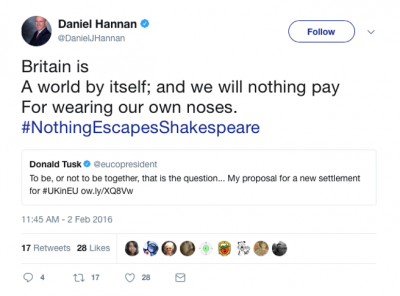
The line encapsulates Hannan’s pro-Leave agenda, and its relative obscurity compared to Tusk’s Hamlet reference smacks of one-upmanship at the game of Shakespeare quotation, implicitly connecting familiarity with Shakespeare with the authority to express opinions on British identity and politics.
Shakespeare functioned as cultural ammunition in disputes surrounding the referendum. In April 2016, the Labour MP Chris Bryant published a piece in The Guardian arguing that “This sceptic isle would most displease pro-Europe Shakespeare.”[7] It prompted a refutation from Hannan, arguing this time that Shakespeare’s words are sufficiently elastic to be deployed in service of any argument, and concluding with the idea that Shakespeare’s supposedly exceptional qualities can be taken as a synecdoche for English exceptionalism: “as long as English is spoken, and Shakespeare’s canon is preserved, we shall never be just another country.”[8] Hannan allegedly celebrated the Leave campaign’s victory in the early hours of 24 June 2016 by leaping onto a table and “reciting the speech from Shakespeare’s Henry V which the title character delivers before the battle of Agincourt.”[9] This performance was consistent with Vote Leave’s efforts to cast themselves as plucky underdogs against the bloated complacence of the Remain campaign. A poster attributed Leave.EU quoted from the final lines of King John: “This England never did nor never shall/ Lie at the proud foot of a conqueror.”[10] The phrase “sceptered isle,” taken from John of Gaunt’s deathbed speech in Richard II, was used regularly by campaigners as an epithet for the United Kingdom—though the speech itself mentions only England.[11] Hannan quoted Gaunt’s speech to a bemused European Parliament as early as 2009 and posted the video to his own YouTube channel with the title ‘Shakespeare on the EU.’ This sleight of hand represented Hannan himself as the spokesman for Shakespeare’s prescient views on twenty-first century politics, while also wielding Shakespeare as evidence of British (or again, English) exceptionalism.
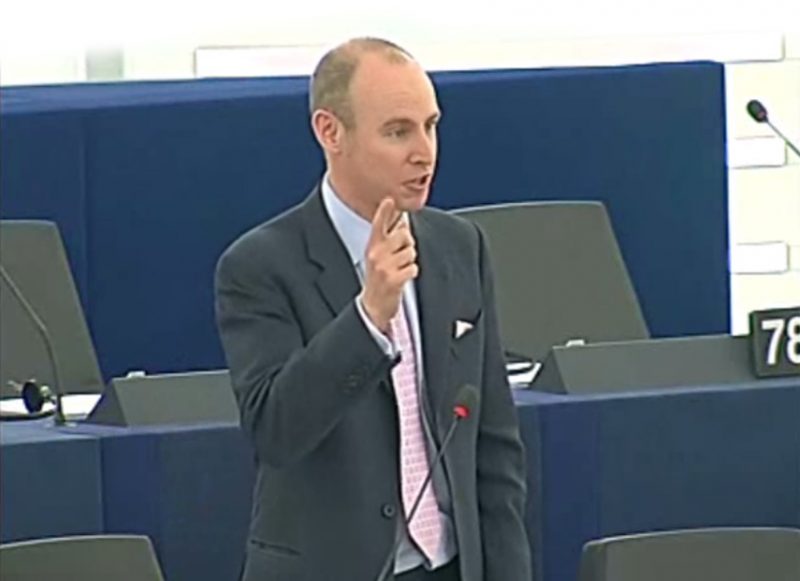
During the build-up to the referendum campaigners reached for Shakespeare to define a national identity supporting the version of the country they wanted. The use of Shakespeare added a historical heft to their ideas, but in most cases, the words used had already become clichés over centuries of patriotic quotation. As such, rather than acquiring a new significance through their association with a contemporary political question, these quotations recycled a composite national identity made up of multi-layered nostalgia: for Shakespeare’s time, but more acutely for an unspecified cultural climate—more ideological than historical—in which Shakespeare’s right and capacity to speak for the nation would have gone unquestioned.
I argue in this essay that Shakespeare quotation functions politically as a species of nostalgia. I also suggest that this turn to Shakespearean quotation is indicative of a failure of critical reading which has characterised recent politics. Mark Thompson identified “a crisis in political language” in a year which saw populist far-right movements gaining power in the UK and USA and popularity elsewhere in the world; in particular, he noted that their use of “highly synoptic” language limited politicians’ capacity for dialogue and compromise.[12] Quoted soundbites are repeated, shedding their historical and literary contexts as they pass between media. But instead of becoming meaningless with repetition, Shakespearean fragments like “sceptered isle” pick up a more amorphous set of meanings derived from the ideological positions associated with the speakers. The “sceptered isle” becomes the England that the listener understands to be the one Hannan wants, and though it has been taken out of context, the quotation implies that Hannan’s vision is validated by Shakespeare. As Charles LaPorte observes in his study of devotional Shakespeare quotation in the nineteenth century, the playwright’s hegemonic status is such that his authority can be taken for granted, and “any part of any version [of his plays] can be used as a synecdoche for the genius of the canon.”[13] Political Shakespeare quotation repeats a fairly consistent set of speeches to assert an ontologically secure national and historical identity.
As the political biases of newspapers have become more visible (largely because they are more extreme), readers have become more accustomed to reading sceptically, if not always analytically. But beyond the academy, literary scholars are often failing to make the case that literary and historical texts need to be read with a similar degree of mistrust. This essay resists the idea (as in Hannan’s conclusion that England “will never be just another country”) that veneration of Shakespeare is a harmless, celebratory form of British patriotism, arguing that such formulations always exclude or oppose some national other, either internal (Scotland, Wales and Northern Ireland) or external (usually, France, sometimes as a synecdoche for Europe). On these grounds, I argue against historical parallels that use the past to explain the present—a scholarly instinct often stemming from our anxiety that the texts we study and teach are not relevant to the contemporary lives of our students. And I suggest that current trends in criticism that focus on what has been excluded from the canon might offer a way for political quotations to invite debate rather than continuing to be impoverished by repetition.
I. National Identity as Literary Collage
Politicians use quotations for a variety of reasons: to suggest that other people agree with them; to associate themselves with political or historical figures; to borrow eloquence from a respected predecessor. Literary quotations usually have a rhetorical function rather than an evidential one. Judi Atkins and Alan Finlayson’s study of quotation in political rhetoric suggests that such quotations “demonstrate general erudition while indicating our familiarity with a specific canon of reference points … to show fidelity [to] a larger cultural tradition.”[14] For example, Margaret Thatcher’s quotation from Hamlet in her 1989 conference speech—“if you aspire to lead this nation: ‘This, above all, to thine own self be true’”—used an utterly conventional platitude (“be true to yourself!”) but cited it in a Shakespearean form so that the sentiment appeared more profound and associated Thatcher with a cultural figure.[15] Michelle Yost’s analysis of Shakespeare quotation in US Congressional rhetoric shows that a trend of anti-intellectualism has influenced how some politicians cite Shakespeare. Yost observes that quotation is “used primarily to argue against legislative measures” and suggests that politicians engage in a performative distrust of the “high culture” Shakespeare represents.[16] For instance, she quotes Senator Mike Enzi of Wyoming condemning the State Children’s Health Insurance program: “A rose by any other name would smell as sweet. But the so-called new SCHIP plan is essentially the same as the old one, and it still stinks.” Shakespeare is quoted and then dismissed, creating a bathetic contrast between the poetic language borrowed from Romeo and Juliet and the “straight-talking” senator. Yost uses this and other examples to show how anti-intellectual movements in US politics use Shakespeare (perhaps paradoxically) to distance themselves from elite culture. Literary quotation, then, serves an ambivalent purpose: not scholarly, like an evidential quotation, but rhetorical, enabling the politician to occupy a position which is cultured but still populist, and to maintain some distance from anything perceived as intellectual or elitist. In British politics, similar anti-intellectual currents became apparent around the Brexit referendum (notoriously, Gove suggested on Sky News on 3 June 2016 that “people in this country have had enough of experts”). Nonetheless, Shakespeare is usually quoted more earnestly—as in the examples from Hannan above—not as an out-of-date literary figure to be dismissed, but as an enduring genius and as part of the fabric of the nation.

Shakespeare quotation is by no means a new phenomenon in UK politics; however, in the 21st-century context of “post-truth” political rhetoric, quotation began to play a slightly different role. Thompson suggests that populist right-wing movements in 2010s politics, such as the Leave campaign in the UK and Donald Trump’s presidential campaign in the US, were symptoms of a breakdown of the language of political argument stemming from a desire “to give political language some of the brevity, intensity and urgency we associate with the best marketing but to strip it of explanatory and argumentative power.”[17] An excess of quotation, particularly the kind of short soundbite quotation that will fit into the 280 (or, until September 2017, 140) characters of a tweet, reflects what Thompson identifies as the decay of reasoned argument into the slogans and taglines of advertising (“Take Back Control”; “Better Together”; “Make America Great Again!”). Much-quoted, repeated phrases are gradually evacuated of meaning by over-familiarity, but they work upon the electorate by becoming part of the vernacular and by becoming the badges by which we divide ourselves into factions. Not all of these are newly minted taglines for the campaigns in question: the opening of a poem by John Donne, “No man is an island,” emerged as an anti-Brexit slogan, and the connection between marketing and condensed political slogans can be detected in the availability of Donne-inspired fashion for the post-referendum protests.

Many political deployments of quotation are motivated by the desire to make listeners feel that they are united in taste or in aspiration with the speaker. Amongst the leading figures of the Leave campaign, both Hannan and Johnson presented themselves as authorities on Shakespeare (the latter’s proposed biography of the playwright has been delayed indefinitely by the peaks and troughs of Johnson’s political career).[18]
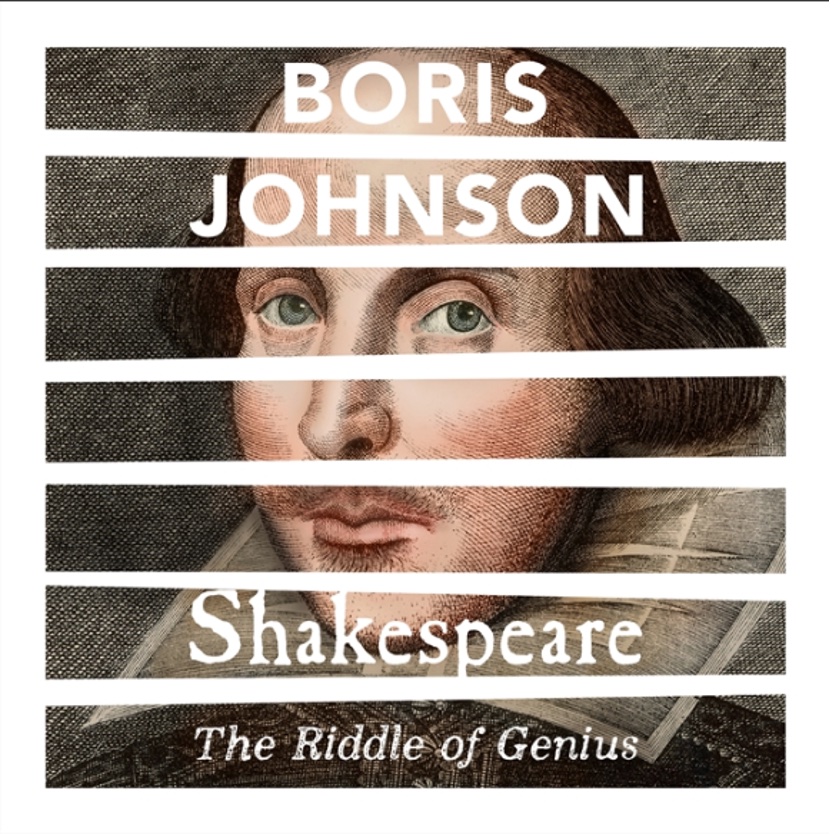
Representing oneself as a Shakespeare enthusiast has a clear political motive in both cases: demonstrating commitment to and love for a canonical “National Poet.” Shakespeare allusions invoke a national heritage of which to be collectively proud, and they situate these politicians within a long-established tradition of patriotic rhetoric in English. They imply that their national identity is rooted in continuity which has already lasted at least four hundred years, from the Elizabethan era—which is constructed as a particularly auspicious period in the English history taught in British schools—to the present day.[19]
The identity constructed by such statements is English rather than British, though these two categories are often blurred. A Shakespearean formulation of national identity asserts continuity from the sixteenth century to the twenty-first in a way that elides the difference between “English” and “British.” This is clearer than ever in an article by Hannan couching his view on the 2014 referendum on Scottish independence in his belief that Shakespeare remains, at times of political upheaval, a guiding voice. Titled “Shakespeare invented Britain. Now he can save it,” the article cites Ben Jonson’s reference to “Britaine” in his eulogy for Shakespeare in the First Folio and the consistency of style between Macbeth and the other tragedies to argue that Shakespeare’s works were instrumental in the union of English and Scottish identity under a collective “British” identity.[20] Given the circular nature of an argument which argues against independence by looking back to a moment prior to the existence of a “United Kingdom”, Hannan’s deployment of Shakespeare makes it glaringly apparent that “British” identity has often entailed a subjection of Scottish, Welsh, and Irish cultures in order to suppress any difference from an overriding Englishness.
Shakespeare’s reputation as genius derives in large part from a tradition of defining national identity by way of cultural superiority. The description of Shakespeare as “National Poet” sprang in the eighteenth century from a culture war between England and France. In the 1720s the French philosopher Voltaire visited London and patronised Drury Lane theatre, where he saw Hamlet. His initial reaction was relatively enthusiastic, but some years later he had changed his mind. The generic hybridity of Shakespeare’s plays was particularly offensive to a devotee of French neoclassical drama, and Voltaire’s attack on Shakespeare announced memorably that Hamlet’s mingling of tragedy with clowning made it appear to be the work of “a drunken savage.”[21]
A series of opposing opinions were published across the Channel: commentators including Elizabeth Montagu, Samuel Johnson, and the Irish critic Arthur Murphy insisted in turn that Shakespeare was, in fact, superior to both Corneille and Racine, and in the process they started a trend of associating appreciation for Shakespeare with English patriotism which would prove enduring. Montagu argued that the “natural” quality of Shakespeare’s writing excused him from adherence to Aristotelian unities: “we have many plays written according to the rules of art; but nature, which speaks in Shakespear, prevails over them all.”[22] Murphy’s indignant open letter to Voltaire in the Gray’s Inn Journal explained that “with us islanders Shakespeare is a kind of established religion in poetry.”[23] As critics laboured to defend Shakespeare from French critique, they positioned him as patron saint of a nationalist religion predicated on difference from, and superiority to, continental Europe. Already a representative of a prelapsarian monarchist past by the time Voltaire’s criticism made English writers rally around him, Shakespeare was also a figure around which to build a nostalgic idea of what the country had once been and in theory could still be, could be again.
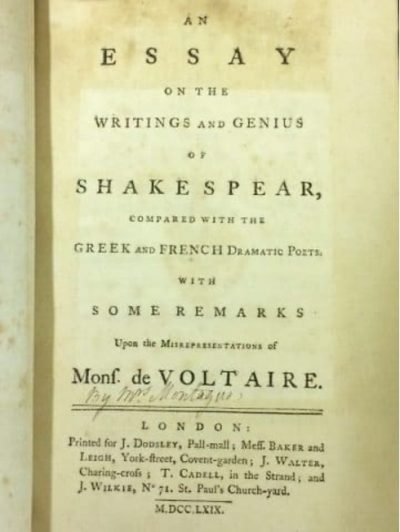
II. Nostalgia and Politics
The media narrative of 2016’s political upheavals made much of a generational divide: a majority of young voters generally rejected both Brexit and Trump, while their grandparents voted in large numbers in favour of them. As a result, both events have been characterised as nostalgic—a democratically expressed desire to turn back the clock on globalisation and restore an unspecified era of social order and coherent values. Nostalgia is not inherently a right-wing or regressive emotion. Svetlana Boym makes distinction in The Future of Nostalgia between two varieties which she calls “restorative” and “reflective” nostalgia. She describes the latter as “wistful” and “ironic,” an expression of a characteristically modern emotion which “dwells on the ambivalences of human longing and belonging,” and which does not seek to establish absolute truths. By contrast, restorative nostalgia “does not think of itself as nostalgia, but rather as truth and tradition” and “attempts a transhistorical reconstruction of the lost home.” Restorative nostalgia is fuelled by the belief that certain truths are universal, and that the values of the past should not be re-examined, let alone revised, in the present. As Boym observes, “the stronger the rhetoric of continuity with the historical past and emphasis on traditional values, the more selectively the past is usually presented.”[24]
The Leave campaign’s rallying cry “Take Back Control” alluded to an imaginary period when “control” was securely in British hands; the Trump campaign was even less tentative about its appeal to nostalgia with the slogan “Make America Great Again.” Technological and ideological shifts have heightened nostalgia particularly in white communities who have felt marginalised by multiculturalism and by the collection of shifting cultural etiquettes often condemned under the blanket term “political correctness.”
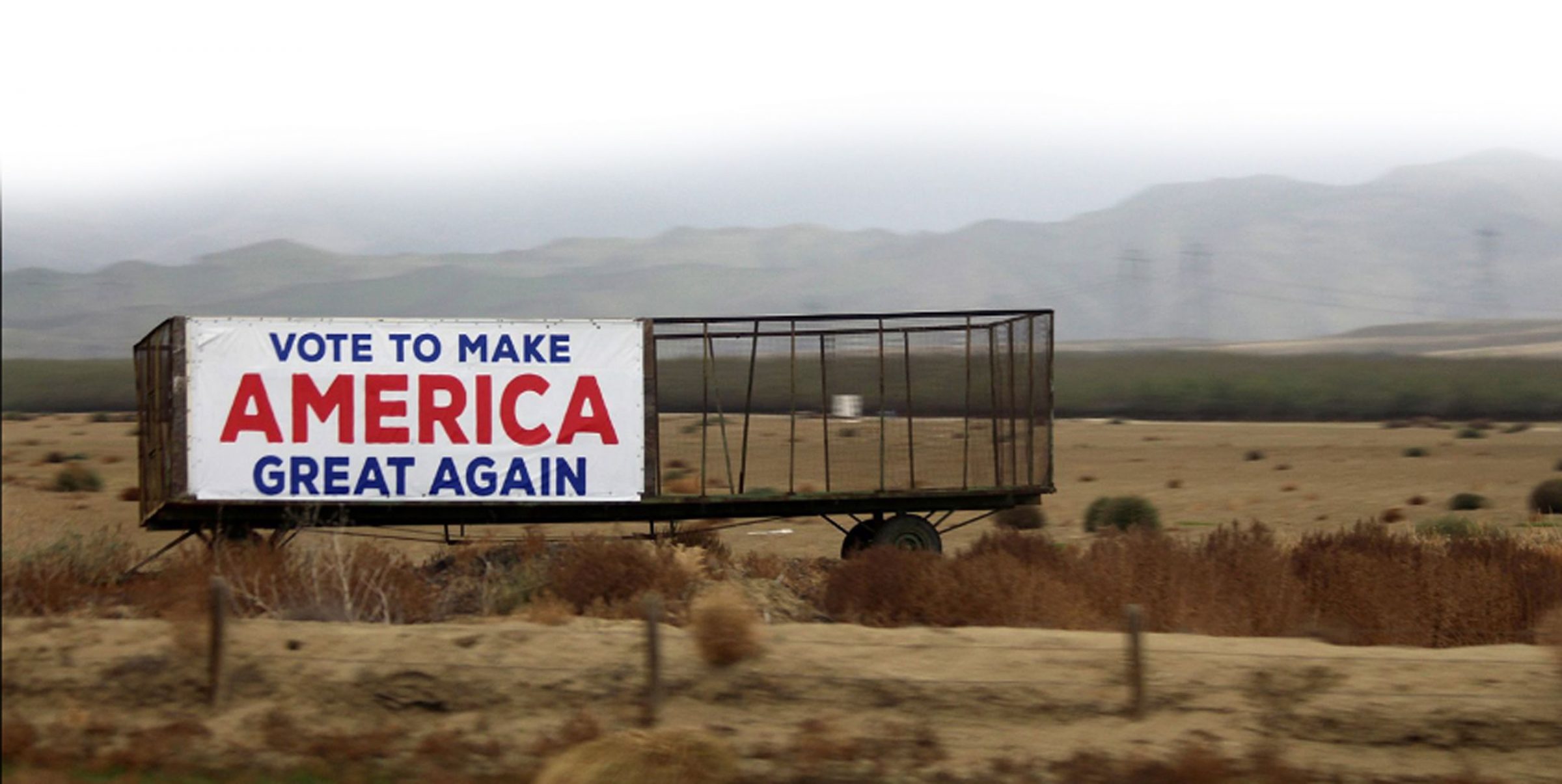
In Britain, this variety of nostalgia often looks back to a period (historically a narrow window) between the end of the Second World War and the collapse of the British Empire, a narrative of former greatness (or rather “control”) which has been temporally expanded in the nostalgic imagination. Nostalgia has always been linked to patriotism—etymologically the word means “longing to return home” from the Greek nostos and algia, and Johannes Hofer, the Swiss medical student who coined the term in 1688, thought of it as a virtue of patriotism to the point of sickness.[25]
The nostalgic politics of 2016 were often narrated in words borrowed from the so-called “National Poet,” whose place not only in the literary canon but in the National Curriculum has been staunchly reinforced by education reforms endorsed by Michael Gove.[26] Shakespeare is presented as a part of the old world worth clinging on to, and as such may provide an excuse not to let any part of it go. Hannan’s favoured hashtag “NothingEscapesShakespeare” reiterates the popular notion that Shakespeare’s works have universal relevance. The contradictory insistence that Shakespeare is both national and universal is key to his patriotic deployment—while nostalgia blurs homecoming with temporal return, the belief that Shakespeare is universal emphasises temporal continuity and asserts England as the historical and geographical centre for a putative global culture, in a cultural extension of the imperialist expansion which was in its infancy in Shakespeare’s lifetime.
Meanwhile, Shakespeare’s reputation for writing universal truths into his plays has led to enormous cultural value being ascribed to the replication of early modern performance conditions. On 25 October 2016, it was announced that the artistic directorship of Emma Rice at Shakespeare’s Globe would be cut short because her artistic choices diverged from the theatre board’s understanding of their commitment to historically authentic performances. The decision divided commentators into clear political factions. Many condemned the theatre’s rejection of Rice as a repudiation of her commitment to diverse casting and gender equality and her lack of reverence for monumental texts. The actor Martin Delaney imagined the Globe board on Twitter as “pale, male, and stale” in the image of the critics from The Muppet Show. But others welcomed the extirpation of political correctness from a pseudo-historical space and defended its right to be all male, all white and “traditionally” costumed—the literal embodiment of the nostalgia Catherine Belsey warned against when she suggested that we can too easily be persuaded that certain truths are universal when we encounter the past “as the present in fancy dress.”[27] A spoof Twitter account responded to the Globe’s announcement with a series of policy proposals gathered under the hashtag “MakeShakespeareGreatAgain.”[28]

The nostalgia fuelling political campaigns in 2016 was not, of course, a true desire to forsake modern technology and live in a fancy-dress early modern London. Rather, it was a desire for a specific organisation of and relationship to history, especially national history. Boym suggests that “the nostalgic desires to obliterate history and turn it into private or collective mythology, to revisit time like space, refusing to surrender to the irreversibility of time that plagues the human condition”; in other words, restorative nostalgia maintains that the past can and should be preserved as a fixed entity.[29] Conceiving history as “collective mythology” resists attempts to challenge and remake historical narratives—for instance, the idea that we should reexamine British imperialism, reorganising the hierarchy of voices authorised to tell this history, or reconsider the ways that history is memorialised, as in the debate following the removal of a statue of the slave trader Edward Colston by protestors in Bristol in June 2020. History as collective mythology is fixed and embedded in contemporary identity—it is not subject to revision or reimagining; its idols are not meant to be torn down. The quotation, performance and analysis of Shakespeare’s English history plays has been a particularly contested area of cultural activity. In the selective history used to forge national identity, Shakespearean history plays have often stood as substitutes for primary sources. According to Thomas Carlyle, a nineteenth-century Duke of Marlborough confessed that he “knew no English history but what he had learned from Shakespeare.” On these grounds, Carlyle proposes Shakespeare’s histories as a national epic, in which “the great salient points” of national history are corralled into “rhythmic coherence.”[30] This arrangement of history into myth, sanctified by the reputation for transcendent wisdom which had, by the nineteenth century, become attached to Shakespeare’s name, was influential in constructing the language of English patriotism.
As a cultural and political rift has become painfully visible in the UK, it has been clear that the vast majority of professional theatre practitioners and of academics in literature departments were on the losing side of the Brexit question.[31] Given this tendency, the Shakespeare remembered in 2016 by professional performers, teachers and interpreters of his works was not predominantly that of Daniel Hannan and Boris Johnson. However, performances of Shakespeare’s plays may need to navigate a political divide between their participants and parts of their audiences. Implicit here is the risk that thoughtful, interrogative performance of Shakespeare—performance as reflective nostalgia—becomes associated with the “elite” culture which opponents attributed to the Remain campaign, while “popular” Shakespeare remains purely celebratory. For example, in late 2015, the Royal Shakespeare Company staged Henry V. The play has a long history of political performance: it was staged as wartime propaganda during the Napoleonic Wars and both World Wars; later it was reimagined as anti-war protest during the Falklands and the second Iraq War. This production was in medieval costume and centred on a genial king played by Alex Hassell, surrounded by an array of comic supporting characters. The Daily Telegraph critic, Dominic Cavendish, wrote a glowing review titled “Just what the nation ordered.”[32] Like Hannan’s political Shakespeare quotation, Cavendish’s review avoids being specific about the limits of that nation: Henry V’s reduction of its Scottish and Irish characters to incomprehensible voices in the service of the English army hints that the nation that “needs” this play is England rather than Britain or the UK.

Peter Kirwan’s review for The Bardathon blog responded eloquently to Cavendish, suggesting that if this play (rather than this production) was what the nation needed from Shakespeare, it would be as a spotlight on the complacency of our leaders, the classist, sexist and xenophobic currents in our society and our armed forces, and the unjustness of our wars.[33] If Cavendish seemed, a year later, to have accurately identified what most of the electorate wanted from Shakespeare (though need remains debateable), it indicated a failure on the part of generations of academics and theatre practitioners to propagate a critical reading of the plays, outside the academy, which could begin to erode their availability as triumphalist propaganda. As Richard Helgerson argued in Forms of Nationhood:
though the plays do bear a subversive potential, neither it nor their festive power of inversion have in fact made themselves felt in any historically disruptive way. Instead, Shakespeare has stood, and he still stands today, for Royal Britain, for a particularly anachronistic state formation based at least symbolically on the monarch and an aristocratic governing class.[34]
The hegemonic role still played by Shakespearean history is further testified by the remarkable consistency of the passages selected for quotation on matters of national identity. Kirwan models a way forward when he responds to Cavendish by putting pressure on his invocation of “the nation” (paraphrasing Captain MacMorris’s othered voice in the play: “what ish my nation? Who talks of my nation?”).[35] In the final section of this essay, I analyse instances of political quotation that use familiar Shakespeare quotations to invoke “the nation,” arguing that their ideological force relies on eliding historical difference, particularly the distinction between English and British.
III. Shakespeare and National Identity
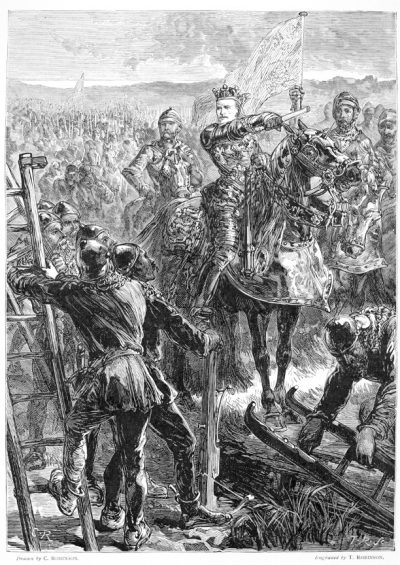
A tradition of patriotic Shakespeare quotation fossilized around particular speeches from the history plays. The Victorian critic Edward Dowden remarked that “the poet does not often deal in mere panegyric of his native land . . . but twice or three times his pride and joy in the glorious land of his birth must have an outbreak.”[36] The examples given to demonstrate Shakespeare’s usually latent patriotic feeling have remained consistent from Dowden’s analysis to Israel Gollancz’s essay “Shakespeare the Patriot” (published to mark the tercentenary of the playwright’s death in 1916), all the way to the Shakespeare memes of Vote Leave campaigners.[37] They include the final lines of King John, John of Gaunt’s deathbed lament from Richard II, and the triumphalist speeches of Henry V. Given their predictable quotation by the patriotic right, these speeches do not so much express a patriotism as they have, over the course of centuries, been allowed to author it.[38] This patriotism is of a specific kind—militaristic, isolationist, and predicated on the envy of other nations. Josh McLoughlin argues in a reading of Richard II and Henry V that “‘Englishness’ and ‘England’ . . . emerge as unstable categories extant only in the language used to articulate them.”[39] But if “the nation” is a nebulous construct in the plays, the quotations are taken out of context in such a way that any nuance inherent in Shakespeare’s “England” is suppressed. When politicians quote these speeches they reiterate an understanding of England as a stable entity inherited from an exalted past and preserved in a revered literature.
The Bastard’s concluding words in King John celebrate England as a military power, secured against incursions from foreign enemies. The claim “This England never did nor never shall / Lie at the proud foot of a conqueror” is only accurate if “this” England is the one established by the Norman conquest of 1066, and it sets a dangerous precedent with its sincere belief in the past as a guarantor of the present and future—never did, therefore never shall. The final line, “If England to itself do rest but true,” is echoed in the Hamlet quotation invoked by Thatcher, “to thine own self be true.” It would be easy to dismiss both sentiments as hollow platitudes, but the former’s confidence that England has the capacity to be and remain self-identical is significant. It demands a national identity that is not only consistent but fixed: its limits firmly established, its self-knowledge invulnerable to question or change. The rhyming couplet and the implacable iambic rhythm of the final line reinforce a sense of fixity and stability—particularly when, as in this Leave.EU campaign poster, the first half of the preceding line (“And we shall shock them”) and the caesura following it are erased.[40]
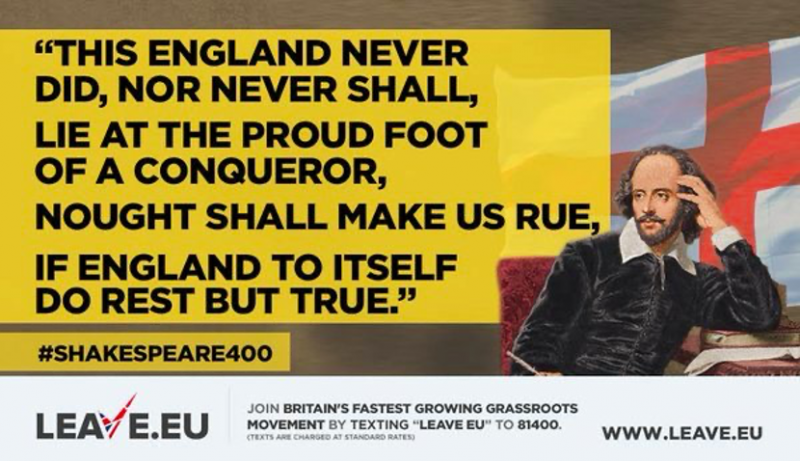
More tellingly, Leave.EU excise the qualification of England’s unconquered status: “But when it first did help to wound itself,” which shifts the national enemy from foreign would-be conquerors to domestic saboteurs. The poster plays both contradictory notes of the Leave campaign’s self-fashioning—the Shakespeare quotation asserts national continuity, but the caption referring to “Britain’s fastest growing grassroots movement” (note the effortless shift from the historical “England” to the contemporary “Britain”) emphasises momentum and novelty. Finally, as is common in Shakespeare quotation, the attribution makes no mention of the individual play, much less the motivations and biases of a specific character. The illustration of a wistful Shakespeare—the likeness derived from a nineteenth-century painting by the Scottish artist John Faed—implies that the aspirations of Leave.EU are the subject of Shakespeare’s own daydreams.
The way Shakespeare’s words are packaged here is indicative of a crisis of reading, because in order to persuade the reader that the quotation has anything to do with the contemporary political campaign, it requires them to take Shakespeare’s authority at face value while overlooking several important omissions. It repackages “England” as an entity that is not subject to question or analysis, and its satisfying rhythm invites the reader to accept tautology as truth. It quotes the manipulative rhetoric of a morally grey character and instead attributes that sentiment to Shakespeare himself, whose cultural capital makes him difficult to argue against. In responding to such an argument, it is crucial to draw attention to its exclusions: Wales and Scotland are erased by the sleight of hand that makes “England” and “Britain” synonyms; Northern Ireland is shrugged off entirely by the omission of “the UK.” The flag in the background is a St George’s Cross, reiterating this poster’s allegiance to England to the exclusion of the rest of the UK. The possibility of “this England” failing to be a united entity “when it first did help to wound itself” is occluded by the editing. Drawing attention to these omissions might not have persuaded any Leave voter that Shakespeare-inspired patriotism is a symptom of restorative nostalgia, but they might illustrate the fact that the “nation” as Shakespeare understood it was not equivalent to the political entity under debate in the twenty-first century.
The construction of England that John of Gaunt celebrates and laments on his deathbed in Richard II is similar in many ways. Though not associated with any specific political cause, a poster quoting the speech, sold in the RSC gift shop, aptly illustrates the elisions required to quote it in a patriotic context: its separation from the rest of the speech conceals the fact that “this England” is being mourned rather than celebrated, and, in order to recognisably superimpose the words onto the shape of the map, Scotland and Wales must both be co-opted into the poster’s textual “England.”
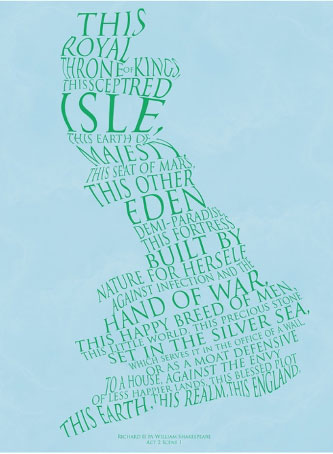
The most significant facet of national identity established in the speech is the notion of England as a target of envy from other nations—this, of course, is echoed in the fear and resentment of migrants which is so much at the core of today’s right-wing politics. The England Gaunt celebrates is (inaccurately) described as an island. This is the basis for the isolationist strain in his rhetoric, where the ocean “serves it in the office of a wall … Against the envy of less happier lands”—the figurative ancestor of the wall President Trump hoped to complete along the US/Mexico border.[41] Mutual envy is also proposed as the distinguishing factor between nations in Henry V, when the King of France describes England and France as “contending kingdoms … whose very shores look pale / With envy of each other’s happiness.”[42] Both descriptions are built around the “happiness” of the country—the personification of “land” necessary to describe it as “happy” implicitly aligns the landmass with the cumulative happiness of its inhabitants, thus imposing a collective identity onto those inhabitants.
Gaunt describes England in a series of metaphors which blur the distinction between the “sceptered isle” and the “happy breed of men” belonging to it. McEachern observes that Gaunt “repeats the locality of the demonstrative “this” sixteen times in twenty-seven lines. The effect is of the near and the dear, a specificity so local it cannot quite be specified.”[43] The repeated assertion of locality allows the “England” Gaunt celebrates to seem secure without any concrete assertion of its nature and limits. The euphoric quality of Gaunt’s description builds up over the course of several lines:
This royal throne of kings, this sceptered isle,
This earth of majesty, this seat of Mars,
This other Eden, demi-paradise,
This fortress built by Nature for herself
Against infection and the hand of war,
This happy breed of men, this little world,
This precious stone set in the silver sea[.][44]
Gaunt celebrates England primarily for its natural beauty and its military advantage as a “fortress” with the “silver sea” for defences, describing the country as “precious” and thus in need of jealous guarding. The speech reaches a crescendo in a line which pulls together the three principal reasons for the country’s “happiness” – royal authority, military power and natural beauty—before finally naming it: “This blessed plot, this earth, this realm, this England!”[45] By the time “England” is named, it has already been circumscribed by a specific set of attributes, and the repetition of “this” enforces the idea that all Gaunt’s metaphors are combined in a stable, self-identical England.
Margaret Tudeau-Clayton reads Gaunt’s nostalgia in this speech in relation to the stock figure of the “motley Englishman” whose manners and fashions display a range of foreign influences, juxtaposed with “an ancient, superior (and now implicitly betrayed), homogenous ‘happy breed of men’ … inhabiting a bound totality.”[46] When Tudeau-Clayton describes these two understandings of Englishness, she could easily be describing the political ferment of the 2016 referendum campaign:
the structural nostalgia of an imprecisely located mythic past fuels the oppositional thrust of the description of a king and court addicted to new foreign fashions, “other” to the ancient “breed” of “this England” that they have implicitly betrayed, the outsiders inside.[47]
In her analysis, it becomes clear that a disputed national identity is no new phenomenon, and that the most aggressive calls for national purity come about at times when a composite identity drawn from multiple histories and cultures appears to occupy the mainstream or even the elite. However, the familiarity of these ideas does not come about because Shakespeare saw contemporary political divisions coming four hundred years in advance, nor because history or politics is essentially repetitive. Rather, these ideas seem uncomfortably familiar because Shakespeare has, to a significant extent, authored the language of English patriotism, and contemporary isolationist rhetoric is frequently a bricolage of his words.
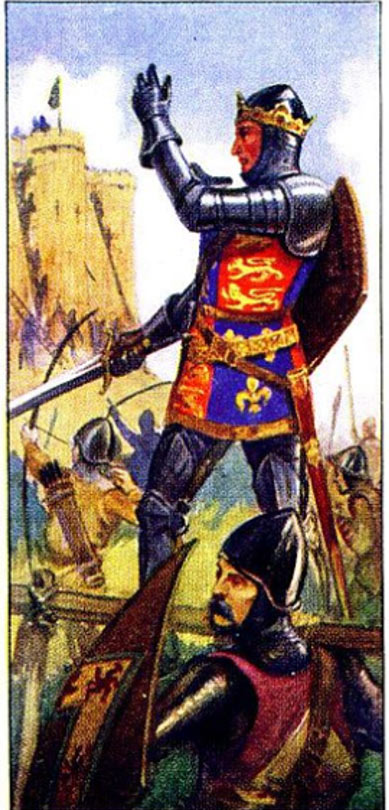
One further instance of Shakespeare quotation in contemporary politics is worth citing here as a potential palliative. On social media and, most prominently, as part of the variety performance held at Stratford on 23 April 2016 to mark the quatercentenary, a speech excavated from a relatively obscure corner of the Shakespeare apocrypha was revived for its resonance with contemporary events.[48] This speech—performed by Ian McKellen at the Stratford gala, fifty-two years after he played the role at Nottingham Playhouse—is from the collaborative play Sir Thomas More, whose prominence among non-canonical plays derives from the fact that it survives in manuscript in the British Library and as such represents, by critical consensus, the only extant example of Shakespeare’s handwriting on a dramatic manuscript.[49] In the speech, More reprimands the people of London for their intolerance toward refugees, and issues a plea for empathy:
Go you to France or Flanders,
To any German province, to Spain or Portugal,
Nay, any where that not adheres to England,—
Why, you must needs be strangers. Would you be pleased
To find a nation of such barbarous temper,
That, breaking out in hideous violence,
Would not afford you an abode on earth,
Whet their detested knives against your throats,
Spurn you like dogs, and like as if that God
Owed not nor made not you, nor that the claimants
Were not all appropriate to your comforts,
But chartered unto them, what would you think
To be thus used? This is the strangers’ case;
And this your mountanish [sic] inhumanity.[50]
McKellen, introducing the speech at the event “The People Speak” in September 2012, described it as “at the heart of Shakespeare’s humanity,” commenting on the accidental symbolic resonance of the fact that it survives as material evidence of his hand.[51]
Ian McKellen performs an excerpt from Sit Thomas More at “The People Speak,” London, September 2012.
It is notable that where Gaunt’s speech takes the personal and makes it political—the cumulative happiness of the inhabitants transferred onto the country and making it the subject of envy—More’s takes the political and makes it personal, demanding an imaginative process that leads to empathy rather than to national mythology.
I want to suggest that a key difference between quoting Sir Thomas More for political purposes and quoting Henry V, Richard II, or King John is the question of canonicity. The collaborative nature of Sir Thomas More challenges conservative notions of genius with its suggestion that collaboration rather than solitary inspiration could be the source of literary masterpieces and therefore of cultural identity — Shakespeare is recast as the motley Englishman rather than the individual representative of Gaunt’s “happy breed of men.” The play’s relative obscurity demands that speaking, reading and listening to this speech is an intellectually engaged process, rather than the parroting of a phrase like “this sceptered isle,” so familiar that its meaning is no longer interrogated and it can be a receptacle for a concept of nationhood that is reassuringly consistent and secure. This is not to say that the Shakespeare of Sir Thomas More has any greater insight on today’s politics than that of the other plays. However, quoting this play and this speech uses the overblown genius of Shakespeare to open new questions, rather than to confirm that the old ones are already settled.
IV. Coda: Nostalgia
I started my PhD in 2012, expecting to finish it in 2016. As I began my research at King’s College London, which became the hub of the Shakespeare400 celebrations, I was looking forward to looking back in 2016: using the landmark anniversary to reflect on the four centuries of Shakespeare’s afterlife. I understood that afterlife to be important because the consistency of Shakespeare’s much-repeated words made visible the remarkable inconsistency of their interpretation. The only excuse I could support for giving so much time and energy to a single author, four hundred years dead, was that generations of readers approaching the same play might leave a trace of the processes by which minds and contexts change. That is to say, if canonical texts keep telling us the same things, it is probably time to abandon them and redraw the canon. If Shakespeare is making us feel that nebulous concepts such as “nationhood” are knowable and secure, then Shakespeare is not doing his job properly, and neither are we.
The festivities of the quatercentenary year took many forms, from the traditionalist to the experimental. In many cases, these supposedly commemorative endeavours were not particularly interested in Shakespeare the early modern Englishman. Instead they took up, to varying extents, the opportunity to transform and even challenge his works—in the form of novels commissioned from contemporary writers to remake Shakespeare’s plots, performances fusing elements of Shakespeare’s works with dramatic styles from other cultures, and the short animations dramatizing iconic images from Shakespearean art history. These new artworks took inspiration from the past, but in many cases they did not engage with it in a mood of restorative nostalgia: they propelled the literature of the past into the churn of the present; they addressed it to their anxieties for the future. We must be cautious of commemoration if it gives us too much certainty about where we have come from, who we are, and where, therefore, we must be going. Nora Williams rightly challenged the “mollifying magic” of Shakespeare commemoration, in a year that ended with global politics poised on the edge of upheavals whose repercussions have only begun to be felt.[52]

Works Cited:
Atkins, Judi, and Alan Finlayson. “‘As Shakespeare so Memorably Said…’: Quotation, Rhetoric, and the Performance of Politics.” Political Studies, 2014: 1–18.
Bate, Jonathan. The Genius of Shakespeare. London: Picador, 1998.
Belsey, Catherine. The Subject of Tragedy: Identity and Difference in Renaissance Drama. Abingdon and New York: Routledge, 1985.
Bennett, Owen. The Brexit Club: The Inside Story of the Leave Campaign’s Shock Victory. Biteback Publishing, 2016.
Boym, Svetlana. The Future of Nostalgia. New York: Basic Books, 2001.
“Brexit Does Shakespeare: The Economist presents the Tragedy of MacGove.” The Economist, 1 July 2016. https://www.economist.com/news/britain/21701600-modern-day-drama-political-courage-and-bloody-deeds-economist-presents-tragedy
Bryant, Chris. “This sceptic isle would most displease pro-Europe Shakespeare.” The Guardian, 21 April 2016. https://www.theguardian.com/commentisfree/2016/apr/21/how-love-eu-count-william-shakespeare-remain-brexit
Carlyle, Thomas. “The Hero as Poet. Dante. Shakespeare.” In On Heroes, Hero Worship and the Heroic in History. London: Chapman and Hall, 1840.
Cavendish, Dominic. “Henry V, RSC, Stratford, review: ‘just what the nation ordered’.” Daily Telegraph, 23 September 2015. (https://www.telegraph.co.uk/theatre/what-to-see/henry-v-royal-shakespeare-company-review/)
Dickson, Andrew. “The Book of Sir Thomas More: Shakespeare’s only surviving literary manuscript.”(https://www.bl.uk/collection-items/shakespeares-handwriting-in-the-book-of-sir-thomas-more)
Dobson, Michael. The Making of the National Poet: Shakespeare, Adaptation and Authorship, 1660–1769 (Oxford: Clarendon Press, 1992).
Dowden, Edward, “General Introduction.” Reprinted in The Henry Irving Shakespeare, 1888. Volume 8.
Greenslade, Roy. “Newspapers draw on Shakespeare to report Gove’s knifing of Johnson.” Guardian, 1 July 2016. https://www.theguardian.com/media/greenslade/2016/jul/01/newspapers-draw-on-shakespeare-to-report-goves-knifing-of-johnson
Hannan, Daniel J. @DanielJHannan. “Britain is A world by itself; and we will nothing pay For wearing our own noses. #NothingEscapesShakespeare.” Twitter 2 February 2016, 11.45am. https://twitter.com/DanielJHannan/status/694486788736442368
— “Shakespeare invented Britain. Now he can save it.” The Spectator, 12 April 2014. (https://www.spectator.co.uk/2014/04/voice-of-britain/)
— “How like a God: Shakespeare and the invention of the world.” CAPX 26 December 2016 (originally posted April 2016). https://capx.co/how-like-a-god-shakespeare-and-the-invention-of-the-world-2016/
Helgerson, Richard. Forms of Nationhood: The Elizabethan Writing of England. Chicago and London: University of Chicago Press, 1992.
Hofer, Johannes. “Medical Dissertation on Nostalgia.” Trans. Carolyn Kiser Anspach, Bulletin of the Institute of the History of Medicine, Vol. 2. Baltimore: Johns Hopkins Press, 1934.
Kirwan, Peter. “Henry V (RSC/Live from Stratford-upon-Avon) @ The Broadway, Nottingham.” The Bardathon, University of Nottingham. Blog. 23 October 2015.
LaPorte, Charles. “The Devotional Texts of Victorian Bardolatry” in Shakespeare, the Bible, and the Form of the Book: Contested Scriptures. Ed. Travis DeCook and Alan Galey. Abingdon & NY: Routledge, 2012. 143–59.
McDonagh, Melanie. “Michael Gove will go down in history as the Tory party’s Iago.” Evening Standard 8 July 2016. https://www.standard.co.uk/comment/comment/melanie-mcdonagh-michael-gove-will-go-down-in-history-as-the-tory-party-s-iago-a3291501.html
McEachern, Claire. The Poetics of English Nationhood, 1590–1612. Cambridge: Cambridge University Press, 1996.
McLoughlin, Josh. “Would Shakespeare join the EDL?: Nationalism and National Poets.” Sonder Magazine, 3 June 2015. https://sondermag.wordpress.com/2015/06/03/would-shakespeare-join-the-edl-nationalism-and-national-poets-2/
Montagu, Elizabeth. An Essay on the Writings and Genius of Shakespear, compared with the Greek and French dramatic poets: With some remarks upon the misrepresentations made by Mons. de Voltaire. London: J. and H. Hughs, 1770.
Murphy, Arthur. Gray’s Inn Journal 12, 15 December 1753.
O’Neill, Stephen, ‘Shakespeare’s Hand, or “the stranger’s case”: Remediating Sir Thomas More in the context of the Refugee Crisis,’ Borrowers and Lenders: The Journal of Shakespeare and Remediation 13.1 (2020). https://www.borrowers.uga.edu/784504/show
Prince, Kathryn. “Shakespeare and English nationalism.” In Shakespeare in the Eighteenth Century. Ed. Fiona Ritchie and Peter Sabor. Cambridge: Cambridge University Press, 2012. 277–94.
Thatcher, Margaret. Speech to Conservative Party Conference, 13 October 1989.
Thompson, Mark. Enough Said: What’s Gone Wrong with the Language of Politics? London: Penguin, 2016.
Tudeau-Clayton, Margaret. “The ‘trueborn Englishman’: Richard II, The Merchant of Venice, and the Future History of (the) English.” In This England, That Shakespeare: New Angles on Englishness and the Bard. Eds. Willy Maley and Margaret Tudeau-Clayton. Farnham and Burlington: Ashgate, 2010. 63–85.
Tusk, Donald. @eucopresident, “To be, or not to be together, that is the question. . . . My proposal for a new settlement for #UKinEU.” Twitter, 2 February 2016, 11:35am, https://twitter.com/eucopresident/status/694484267015995393?lang=en
Willems, Michèle. “Voltaire.” In Voltaire, Goethe, Schlegel, Coleridge: Great Shakespeareans Volume III. Ed. Roger Paulin. London and New York: Continuum, 2010, 5–43.
Williams, Nora., “Seriously, Calm Down: A Healthy Dose of #Shakespeare400 skepticism.” Howl Round, 11 July 2016. https://howlround.com/seriously-calm-down-a-healthy-dose-of-shakespeare400-skepticism
Yost, Michelle. “Borrowing the Bard: Using Shakespeare for Validation in US Congressional Rhetoric,” conference presentation, The British Graduate Shakespeare Conference, Stratford-upon-Avon, 11 June 2012. https://thesymzonian.wordpress.com/2012/11/05/borrowing-the-bard-using-shakespeare-for-validation-in-us-congressional-rhetoric/
